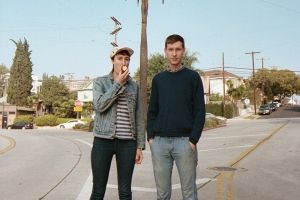Live Bands

Scopri tutto su lucky dragons, concerti, eventi, news e molto altro!
The ‘communal experiment’ that is Lucky Dragons started as a ‘band’ in 1999 in San Francisco. Their concerts-as-workshop style happenings have generated considerable interest in both the art and music worlds.
Founder Luke Fischbeck has an academic background in music from Brown University, where he met Sarah Anderson, aka Sarah Rara, who studied comparative literature. The pair sought to forge a new definition of ‘band’ that included contexts such as public art, the gallery system, museum programming, blogs, and small-press publishing; a way to subvert the accepted power structures of musical performance and creation through workshop-performances. Everything produced is released under a Creative Commons Attribution-Non-Commercial-Share Alike license.
Lucky Dragons are notorious for the ‘reverse-shoplifting’ distribution of their 2003 album Hawks and Sparrows, which involved planting copies of the album in records stores across the globe. The album itself was made up entirely of field recordings from anti-war protests across the US in 2003. The CDs were packaged with early spring flowers pressed into each case, with a digital version available for free download from the Hawks and Sparrows website. The pair has recorded 19 albums in total, all under the creative commons license, with some appearing on small labels such as 555 Recordings, Ultra Eczema, and Marriage Records (their 2004 track “Heartbreaker| appearing on a Warp Records compilation) and all available for free download.
Lucky Dragons performances include live music, video projection, and sounds created in collaboration with the audience. With a basic set-up of laptop, homemade electronics, and folk instruments, the pair – often with collaborators – use offbeat premises to encourage audience participation. ‘Complement Song’ (2006) implores audience members to compliment each other, while ‘Make a Baby’ encourages physical contact. They are also participants in the Dublab/Creative Commons art instillation project, “Into Infinity” – a CC-licensed art and music project themed around the infinite possibilities of creative reuse.
Lucky Dragons have performed at NY’s PS1, the Centre Georges Pompidou in Paris, the Philadelphia Institute for Contemporary Art, the Portland Institute for Contemporary Art, the Museum of Contemporary Art San Diego, Frankfurt’s Schirn Kunsthalle, Los Angeles’ The Smell, NY’s The Kitchen, the 2008 Whitney Biennial, The Smithsonian Institute’s Hirshorn Museum, and Tokion’s “Creativity Now” conference. Side projects include Sumi Ink Club – a weekly collaborative drawing society, and Glaciers of Nice – a publishing effort that ties together different projects, packaging and distributing them as hard copies/ physical objects.
Lucky Dragon (Daigo Fukuryu Maru) was the name of the Japanese fishing-boat that was caught up in the Bikini Atoll nuclear testing in 1954, exposing the crewmen to nuclear fallout. (Source: CTM Festival)
Altre informazioni
Social
Pensi di dover gestire questa pagina? Fai richiesta con la tua movitazione
